February 21, 2023
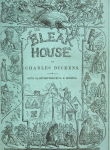 Whoa. This is one of the weirder days in my history. I’ve just realized I’ve never had a Bleak House Cocktail Talk on Spiked Punch before. I mean, you’d think I’d know, right? I write the posts! But there have been many, many posts on here, too many, really, and lots of Dickens Cocktail Talks, and my memory (writing about drinks and all) isn’t as up to snuff as the snuffiest, and I just on some level in my mind took it for granted that I’d had at least one Bleak House Cocktail Talks, but never stopped to check, until today, as I’m rereading said book, and so did indeed double and triple check and, well, weirdly, I never have had a quote from Bleak House on here. Whoa. See, Bleak House may be my favoritest Dickens book of the whole lot of ‘em. Maybe. Hard to say, and I am as we all are different people in some small manner on different days. But it is an all-time classic of the written world, an immense treasure for anyone who likes reading, and if you don’t, well, then check out the BBC Bleak House mini-series, cause it is the absolute tops. Bleak-Freaking-House! Not the peppiest, but I’ve laughed lots when re-reading. Cried, too. Jarndyce and Jarndyce man, it’s a killer. I don’t feel I need to outline the book, cause it’s well-known enough, but I do feel I need to have multiple Cocktail Talks from it to make up for my missteps in not having any on here already. I’m going to start with a dinner recitation from a ‘Slap-Bang’ dining house, where three chaps have been dining out: Guppy (a somewhat central character, who it’s hard not feel for, though he’s a little silly with his slicked-down hair, and a little, not un-savory, but not someone completely trustworthy), who works in one of the central law firms, and his pals Mr. Jobling (less central, law stationer), and Mr. Smallweed (lower clerk in the same firm as Guppy, and grandson to one serious shaking villain).
Whoa. This is one of the weirder days in my history. I’ve just realized I’ve never had a Bleak House Cocktail Talk on Spiked Punch before. I mean, you’d think I’d know, right? I write the posts! But there have been many, many posts on here, too many, really, and lots of Dickens Cocktail Talks, and my memory (writing about drinks and all) isn’t as up to snuff as the snuffiest, and I just on some level in my mind took it for granted that I’d had at least one Bleak House Cocktail Talks, but never stopped to check, until today, as I’m rereading said book, and so did indeed double and triple check and, well, weirdly, I never have had a quote from Bleak House on here. Whoa. See, Bleak House may be my favoritest Dickens book of the whole lot of ‘em. Maybe. Hard to say, and I am as we all are different people in some small manner on different days. But it is an all-time classic of the written world, an immense treasure for anyone who likes reading, and if you don’t, well, then check out the BBC Bleak House mini-series, cause it is the absolute tops. Bleak-Freaking-House! Not the peppiest, but I’ve laughed lots when re-reading. Cried, too. Jarndyce and Jarndyce man, it’s a killer. I don’t feel I need to outline the book, cause it’s well-known enough, but I do feel I need to have multiple Cocktail Talks from it to make up for my missteps in not having any on here already. I’m going to start with a dinner recitation from a ‘Slap-Bang’ dining house, where three chaps have been dining out: Guppy (a somewhat central character, who it’s hard not feel for, though he’s a little silly with his slicked-down hair, and a little, not un-savory, but not someone completely trustworthy), who works in one of the central law firms, and his pals Mr. Jobling (less central, law stationer), and Mr. Smallweed (lower clerk in the same firm as Guppy, and grandson to one serious shaking villain).
Mr. Smallweed, compelling the attendance of the waitress with one hitch of his eyelash, instantly replies as follows: Four veals and hams is three, and four potatoes is three and four, and one summer cabbage is three and six, and three marrows is four and six, and six breads is five, and three Cheshires is five and three, and four pints of half-and-half is six and three, and four small rums is eight and three, and three Pollys is eight and six. Eight and six in half a sovereign, Polly, and eighteenpence out!
Not at all excited by these stupendous calculations, Smallweed dismisses his friends with a cool nod, and remains behind to take a little admiring notice of Polly, as opportunity may serve, and to read the daily papers: which are so very large in proportion to himself, shorn of his hat, that when he holds up The Times to run his eye over the columns, he seems to have retired for the night, and to have disappeared under the bedclothes.
–Charles Dickens, Bleak House
Tags: Bleak House, Charles Dickens, Cocktail Talk, Dickens, Guppy, half-and-half, Part I, Rum
Posted in: beer, Charles Dickens, Cocktail Talk, Rum
February 7, 2023
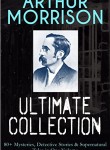 Thanks to the British Library Crime Classics collections (which I’ve Cocktail Talked from a few times), I’ve discovered a number of authors I didn’t know before, ones who were read more in the earlier parts of the last century, including Arthur Morrison. A mystery and crime writer (usually with stories featuring his detective Arthur Hewitt, said stories told by said detective’s neighbor, journalist Brett, in a Watson/Holmes-y way), as well as a more straight fiction writer and journalist and writer about Japanese art. I liked his stories read is those mystery anthologies, so picked up The Collected Arthur Morrison. I haven’t read everything in it, but have read I think all of the Hewitt stories, and they tend to be pretty swell, in the Holmes deductive reasoning vein, but a bit more of an everyman while doing it in a way. He was one of the few at the time (or anytime) to rival Holmes in popularity, too. Some stories in the collection are completely regrettable, but those are in the minority. Not a lot of Cocktail Talking in them, sadly, but there was one story, about a heaping helping of gold on a ship that foundered, which involved diving to check out the scene, and, via the diving, the introduction of a new drink to me.
Thanks to the British Library Crime Classics collections (which I’ve Cocktail Talked from a few times), I’ve discovered a number of authors I didn’t know before, ones who were read more in the earlier parts of the last century, including Arthur Morrison. A mystery and crime writer (usually with stories featuring his detective Arthur Hewitt, said stories told by said detective’s neighbor, journalist Brett, in a Watson/Holmes-y way), as well as a more straight fiction writer and journalist and writer about Japanese art. I liked his stories read is those mystery anthologies, so picked up The Collected Arthur Morrison. I haven’t read everything in it, but have read I think all of the Hewitt stories, and they tend to be pretty swell, in the Holmes deductive reasoning vein, but a bit more of an everyman while doing it in a way. He was one of the few at the time (or anytime) to rival Holmes in popularity, too. Some stories in the collection are completely regrettable, but those are in the minority. Not a lot of Cocktail Talking in them, sadly, but there was one story, about a heaping helping of gold on a ship that foundered, which involved diving to check out the scene, and, via the diving, the introduction of a new drink to me.
“That’s the dress that Gullen usually has,” Merrick remarked. “He’s a very smart fellow; we usually send him first to make measurements and so on. An excellent man, but a bit too fond of the diver’s lotion.”
“What’s that?” asked Hewitt.
“Oh, you shall try some if you like, afterwards. It’s a bit too heavy for me; rum and gin mixed, I think.”
A red nightcap was placed on Martin Hewitt’s head, and after that a copper helmet, secured by a short turn in the segmental screw joint at the neck.
–Arthur Morrison, “The Nicobar Bullion Case”
January 31, 2023
 This quote’s from another story featured in one of the British Library Crime Classics anthologies, edited as always by the indefatigable Martin Edwards (see a couple past British Library Crime Classics Cocktail Talks). This particular collection is called Guilty Creatures, and is roaming with mysteries that circle or feature or highlight or spotlight animals in some way. Being an animal-lover myself, it was an ideal mix of stories for me. Not a lot of Cocktail Talking as you might expect, and (also as you might expect in a collection featuring a range of stories from early-to-middle last century) with a few stories that don’t hit such a high mark, though many, many do. This particular story actually wasn’t one of my favs, but was fun in a way, and has the amazing title “Pit of Screams,” and has snakes playing a big part, and a warning on brandy and Champagne in the below quote that while I can’t agree with, I can certainly understand!
This quote’s from another story featured in one of the British Library Crime Classics anthologies, edited as always by the indefatigable Martin Edwards (see a couple past British Library Crime Classics Cocktail Talks). This particular collection is called Guilty Creatures, and is roaming with mysteries that circle or feature or highlight or spotlight animals in some way. Being an animal-lover myself, it was an ideal mix of stories for me. Not a lot of Cocktail Talking as you might expect, and (also as you might expect in a collection featuring a range of stories from early-to-middle last century) with a few stories that don’t hit such a high mark, though many, many do. This particular story actually wasn’t one of my favs, but was fun in a way, and has the amazing title “Pit of Screams,” and has snakes playing a big part, and a warning on brandy and Champagne in the below quote that while I can’t agree with, I can certainly understand!
In Togarapore to this day they will tell you that the snakes hypnotized the Rajah so that he fell. But what do you think?
He was giddy from the drink and the sun? Yes, that’s another possible explanation. It is bad to drink brandy and Champagne at midday. But neither is correct. What really killed the Rajah was a tear running down the cheek of that girl wife.
I was a young man in those days, very strong and with hot blood. When I saw that tear I bent, unnoticed, and jerked his ankles so that he somersaulted like the rat he was into the Pit of Screams.
— Garnett Radicliffe, “Pit of Screams”
January 17, 2023
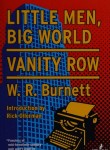 Last week, I had a Vanity Row Cocktail Talk (don’t miss that or past W.R. Burnett Cocktail Talks), the book that shares a cover in the swell Stark House two-books-in-one reprint with this week’s highlight, Little Men, Big World. After mentioning the book in said past Cocktail Talk, felt I should give it a moment of its own. So, here we are! Of the two books, I like them . . . both the same amount, which is a lot. This one jumps around more in narrative perspective, though it also circles again within crime and politics (more the former maybe) in a Midwestern city, with a few different characters from various sides of the scene taking the main role depending on the chapter and such. One of which is veteran newspaper man, Ben Reisman, who used to write the crime beat, but who now is a well-known columnist, though one who still desires to dig up a juicy story. And desires whiskey, too.
Last week, I had a Vanity Row Cocktail Talk (don’t miss that or past W.R. Burnett Cocktail Talks), the book that shares a cover in the swell Stark House two-books-in-one reprint with this week’s highlight, Little Men, Big World. After mentioning the book in said past Cocktail Talk, felt I should give it a moment of its own. So, here we are! Of the two books, I like them . . . both the same amount, which is a lot. This one jumps around more in narrative perspective, though it also circles again within crime and politics (more the former maybe) in a Midwestern city, with a few different characters from various sides of the scene taking the main role depending on the chapter and such. One of which is veteran newspaper man, Ben Reisman, who used to write the crime beat, but who now is a well-known columnist, though one who still desires to dig up a juicy story. And desires whiskey, too.
Sudden success some people said. Sudden success, after twenty-five years? And was this success? How about the plays he’d intended to writer, the novels? Reisman groaned and stared into his glass of Vichy water. The others were drinking whisky. He, too, liked whisky, and some nights he even got drunk. But the doc told him it would kill him and sometimes he was afraid. Why did he have to have ulcers? Young Downy did not have ulcers. Young Downy had pink cheeks and optimism. Not much in the way of brains. But what are brains? A liability.
–W.R. Burnett, Little Men, Big World
January 10, 2023
 I’ve only (I think – but I may be still a little tired from New Year’s Eve) had one other W.R. Burnett Cocktail Talk, he being the writer whose very first book, Little Caesar, was an overnight sensation in 1928, being made into a movie that was also a sensation (and is great), after which he went on to write many novels, screenplays, and more. Including the book we’re quoting from today, Vanity Row, which is thankfully easily available in a two-books-in-one book from Stark House (the other book included is Little Men, Big World, also swell). Vanity Row takes place in an un-named middle-sized Midwestern city, and centers around the murder of one of the town’s movers-and-shakers, following along as police captain (and political chess piece) Roy Hargis tries to solve it, having his own life shaken up in the process. It’s dark and noir-y, showing political underbelly as it was (and is, at heart), moving rapidly around, and boasting a number of memorable moments and characters, including an English reporter named Wesson, highlighted below.
I’ve only (I think – but I may be still a little tired from New Year’s Eve) had one other W.R. Burnett Cocktail Talk, he being the writer whose very first book, Little Caesar, was an overnight sensation in 1928, being made into a movie that was also a sensation (and is great), after which he went on to write many novels, screenplays, and more. Including the book we’re quoting from today, Vanity Row, which is thankfully easily available in a two-books-in-one book from Stark House (the other book included is Little Men, Big World, also swell). Vanity Row takes place in an un-named middle-sized Midwestern city, and centers around the murder of one of the town’s movers-and-shakers, following along as police captain (and political chess piece) Roy Hargis tries to solve it, having his own life shaken up in the process. It’s dark and noir-y, showing political underbelly as it was (and is, at heart), moving rapidly around, and boasting a number of memorable moments and characters, including an English reporter named Wesson, highlighted below.
“What should follow perch, Lloyd?” he called to the little black-haired Welsh bartender.
“That a questions, Mr. Wesson, sir?” said Lloyd, hurrying back eagerly to talk. “A good brandy perhaps.”
“The very thing, Lloyd.”
The bartender returned with the brandy. “Didn’t you say one night you’ve never been in Cardiff, sir?” Lloyd treated Wesson with exaggerated deference which was very unusual for him. He was considered an expert bartender and for that reason was kept on, but he was a surly, fantastical character. There had been many complaints about him from patrons.
–W.R. Burnett, Vanity Row
December 20, 2022
 I’ve only yet had one other Cocktail Talk (The Case of Oscar Brodski Cocktail Talk, from the Blood on the Tracks anthology) from a British Library Crime Classics collection, though I hope to have more. These collections (there are a fair amount now, themed often in various ways) bring together some more famous, some less famous, some oft anthologized, some mostly forgotten mystery and crime stories written by British authors mainly in the early part of the last century. They’re loads of fun. Not all the stories are top shelf, but I haven’t read one yet (and I have three of the collections now) that didn’t have some merit. In them, better-known names (the awesome Arthur Conan Doyle for one) sit alongside lesser-known authors, some of whom were renowned during their times, then faded from public knowledge as years passed. As happens! Just today, I was reading the collection called Settling Scores, which contains murders and crimes around various types of sports and sporting events: tennis, golf, squash, boxing, and more, including rowing, which is where our Cocktail Talk comes from, as might be guessed from the story’s title, “The Boat Race Murder.” It was written by David Winser, who had a burgeoning writing career (and doctoring career) cut tragically short by a bomb in WWII. The series editor (and well-known mystery writer in his own right) Martin Edwards provides helpful bios for each author, along with picking the stories. You might think, “sports,” and expect a lack of Cocktail Talking (training and all) – I didn’t expect to find a quote quite right myself. But then came across the below, which is perfect.
I’ve only yet had one other Cocktail Talk (The Case of Oscar Brodski Cocktail Talk, from the Blood on the Tracks anthology) from a British Library Crime Classics collection, though I hope to have more. These collections (there are a fair amount now, themed often in various ways) bring together some more famous, some less famous, some oft anthologized, some mostly forgotten mystery and crime stories written by British authors mainly in the early part of the last century. They’re loads of fun. Not all the stories are top shelf, but I haven’t read one yet (and I have three of the collections now) that didn’t have some merit. In them, better-known names (the awesome Arthur Conan Doyle for one) sit alongside lesser-known authors, some of whom were renowned during their times, then faded from public knowledge as years passed. As happens! Just today, I was reading the collection called Settling Scores, which contains murders and crimes around various types of sports and sporting events: tennis, golf, squash, boxing, and more, including rowing, which is where our Cocktail Talk comes from, as might be guessed from the story’s title, “The Boat Race Murder.” It was written by David Winser, who had a burgeoning writing career (and doctoring career) cut tragically short by a bomb in WWII. The series editor (and well-known mystery writer in his own right) Martin Edwards provides helpful bios for each author, along with picking the stories. You might think, “sports,” and expect a lack of Cocktail Talking (training and all) – I didn’t expect to find a quote quite right myself. But then came across the below, which is perfect.
You must try and picture a fizz night at Ranelagh. Someone, the coach or some other old Blue, had suddenly produced a dozen bottles of Champagne, and the coach has said that the crew’s been going so well that it damn well deserves the filthy stuff. Actually, as he and everyone else knows, the main purpose of the fizz is to stop the crew getting stale.
–David Winser, The Boat Race Murder
December 13, 2022
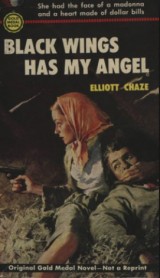 It wasn’t that long ago (weirdly, it was like five-and-a-half years ago, so maybe long ago in some ways? Your call) that I had a series of Cocktail Talks from the Elliott Chaze book Black Wings Has My Angel (read Part I, Part II, and Part III to learn more, see more, drink more). And today, when I woke with the desire to re-read the book (as one does with good books), and then began reading, I was again mystified that the book isn’t better know. Perhaps it’s better known now than five years ago, as another reprint in English has come out – for a long time, too long, the only recent versions were in French. It’s such a classic literary noir novel, and so well-written, it baffles me. Possibly it’s because he didn’t write a lot of books, period, and definitely that I know of, not another in this vein at this level. I’m still trying to track down other books by him, so might be wrong-footing that. But he wasn’t prolific as, say, Jim Thompson or David Goodis (who he shares some commonalities with, in this book if not others I’ve yet to read) in the novel knocking out department, and wasn’t a pulp mag story filler like Day Keene, having I’m guessing higher aspirations, and also a day job as a newspaper person. Maybe it’s that lighter output, but heck, maybe it’s just fate. Whatever, if you lean noir-y, and haven’t read this, you should. There’s more about the book in those old posts, but short story: criminal, femme fatale (both mains carrying layers), crime (with a murder, cold-blooded), the high-life, the lam-life, and bleak moments, written incredibly well. And booze. Especially I.W. Harper whiskey, which you could sip while reading. Enough of it that when I decided to have one more Cocktail Talk from the book, well, I.W. had to be a highlight.
It wasn’t that long ago (weirdly, it was like five-and-a-half years ago, so maybe long ago in some ways? Your call) that I had a series of Cocktail Talks from the Elliott Chaze book Black Wings Has My Angel (read Part I, Part II, and Part III to learn more, see more, drink more). And today, when I woke with the desire to re-read the book (as one does with good books), and then began reading, I was again mystified that the book isn’t better know. Perhaps it’s better known now than five years ago, as another reprint in English has come out – for a long time, too long, the only recent versions were in French. It’s such a classic literary noir novel, and so well-written, it baffles me. Possibly it’s because he didn’t write a lot of books, period, and definitely that I know of, not another in this vein at this level. I’m still trying to track down other books by him, so might be wrong-footing that. But he wasn’t prolific as, say, Jim Thompson or David Goodis (who he shares some commonalities with, in this book if not others I’ve yet to read) in the novel knocking out department, and wasn’t a pulp mag story filler like Day Keene, having I’m guessing higher aspirations, and also a day job as a newspaper person. Maybe it’s that lighter output, but heck, maybe it’s just fate. Whatever, if you lean noir-y, and haven’t read this, you should. There’s more about the book in those old posts, but short story: criminal, femme fatale (both mains carrying layers), crime (with a murder, cold-blooded), the high-life, the lam-life, and bleak moments, written incredibly well. And booze. Especially I.W. Harper whiskey, which you could sip while reading. Enough of it that when I decided to have one more Cocktail Talk from the book, well, I.W. had to be a highlight.
The bartender wore a phony gay-nineties mustache and a checked vest, and he was drunk enough himself to slosh the stuff around generously. Two I. W. Harpers painted the room prettily. I got a kick out of being in a crowd of people who were out to enjoy themselves. There were pictures over the bar of John K. Sullivan and of Gentleman Jim Corbett both stripped to the waist and wearing the kind of pants you see on tightwire performers and ballet dancers.
–Elliott Chaze, Black Wings Has My Angel
December 5, 2022
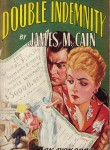 I’ve had a few James M. Cain Cocktail Talks here, which makes pretty swell sense, as he is a noir master, and I like those kinds of books lots, lots I tell you. It’s mad to think that perhaps the most classic of the Cain classics (though opinions may vary, with good reason), The Postman Always Rings Twice and Double Indemnity, came out within a year of each other, or very close. What a whammo one two punch in the brain that was! The other day I had an urge to pick up a book that I could read probably in a single day, at the most two, and I reached for the latter of that deadly duo, Double Indemnity. It’d been a bit since I’d re-read a Cain, and also, it’s just not a very long book, my copy clocks in at 125 pages, and it moves scenically, emotionally, crazily, so quickly through its tale of murder, insurance fraud, and madness (in a way). Such good pacing, and such a master class in economical writing, if there are people who haven’t read it, well, they should! Calculating (to say it mildly) narrator, femme fatale, sideways sort-of hero (or crime solver), multiple crimes, maybe the noir-est ending out there, what a book! And what a quote below about not being able to get stinko!
I’ve had a few James M. Cain Cocktail Talks here, which makes pretty swell sense, as he is a noir master, and I like those kinds of books lots, lots I tell you. It’s mad to think that perhaps the most classic of the Cain classics (though opinions may vary, with good reason), The Postman Always Rings Twice and Double Indemnity, came out within a year of each other, or very close. What a whammo one two punch in the brain that was! The other day I had an urge to pick up a book that I could read probably in a single day, at the most two, and I reached for the latter of that deadly duo, Double Indemnity. It’d been a bit since I’d re-read a Cain, and also, it’s just not a very long book, my copy clocks in at 125 pages, and it moves scenically, emotionally, crazily, so quickly through its tale of murder, insurance fraud, and madness (in a way). Such good pacing, and such a master class in economical writing, if there are people who haven’t read it, well, they should! Calculating (to say it mildly) narrator, femme fatale, sideways sort-of hero (or crime solver), multiple crimes, maybe the noir-est ending out there, what a book! And what a quote below about not being able to get stinko!
I didn’t dare call her up, because for all I knew even now her wires might be tapped. I did that night what I had done the other two nights, while I was waiting on the inquest, I got stinko, or tried to. I knocked off a quart of Cognac, but it didn’t have any effect. My legs felt funny, and my ears rang, but my eyes kept staring at the dark, and my mind kept pounding on it, what I was going to do. I didn’t know. I couldn’t sleep, I couldn’t eat. I couldn’t even get drunk.
–James M. Cain, Double Indemnity
 Whoa. This is one of the weirder days in my history. I’ve just realized I’ve never had a Bleak House Cocktail Talk on Spiked Punch before. I mean, you’d think I’d know, right? I write the posts! But there have been many, many posts on here, too many, really, and lots of Dickens Cocktail Talks, and my memory (writing about drinks and all) isn’t as up to snuff as the snuffiest, and I just on some level in my mind took it for granted that I’d had at least one Bleak House Cocktail Talks, but never stopped to check, until today, as I’m rereading said book, and so did indeed double and triple check and, well, weirdly, I never have had a quote from Bleak House on here. Whoa. See, Bleak House may be my favoritest Dickens book of the whole lot of ‘em. Maybe. Hard to say, and I am as we all are different people in some small manner on different days. But it is an all-time classic of the written world, an immense treasure for anyone who likes reading, and if you don’t, well, then check out the BBC Bleak House mini-series, cause it is the absolute tops. Bleak-Freaking-House! Not the peppiest, but I’ve laughed lots when re-reading. Cried, too. Jarndyce and Jarndyce man, it’s a killer. I don’t feel I need to outline the book, cause it’s well-known enough, but I do feel I need to have multiple Cocktail Talks from it to make up for my missteps in not having any on here already. I’m going to start with a dinner recitation from a ‘Slap-Bang’ dining house, where three chaps have been dining out: Guppy (a somewhat central character, who it’s hard not feel for, though he’s a little silly with his slicked-down hair, and a little, not un-savory, but not someone completely trustworthy), who works in one of the central law firms, and his pals Mr. Jobling (less central, law stationer), and Mr. Smallweed (lower clerk in the same firm as Guppy, and grandson to one serious shaking villain).
Whoa. This is one of the weirder days in my history. I’ve just realized I’ve never had a Bleak House Cocktail Talk on Spiked Punch before. I mean, you’d think I’d know, right? I write the posts! But there have been many, many posts on here, too many, really, and lots of Dickens Cocktail Talks, and my memory (writing about drinks and all) isn’t as up to snuff as the snuffiest, and I just on some level in my mind took it for granted that I’d had at least one Bleak House Cocktail Talks, but never stopped to check, until today, as I’m rereading said book, and so did indeed double and triple check and, well, weirdly, I never have had a quote from Bleak House on here. Whoa. See, Bleak House may be my favoritest Dickens book of the whole lot of ‘em. Maybe. Hard to say, and I am as we all are different people in some small manner on different days. But it is an all-time classic of the written world, an immense treasure for anyone who likes reading, and if you don’t, well, then check out the BBC Bleak House mini-series, cause it is the absolute tops. Bleak-Freaking-House! Not the peppiest, but I’ve laughed lots when re-reading. Cried, too. Jarndyce and Jarndyce man, it’s a killer. I don’t feel I need to outline the book, cause it’s well-known enough, but I do feel I need to have multiple Cocktail Talks from it to make up for my missteps in not having any on here already. I’m going to start with a dinner recitation from a ‘Slap-Bang’ dining house, where three chaps have been dining out: Guppy (a somewhat central character, who it’s hard not feel for, though he’s a little silly with his slicked-down hair, and a little, not un-savory, but not someone completely trustworthy), who works in one of the central law firms, and his pals Mr. Jobling (less central, law stationer), and Mr. Smallweed (lower clerk in the same firm as Guppy, and grandson to one serious shaking villain).


























